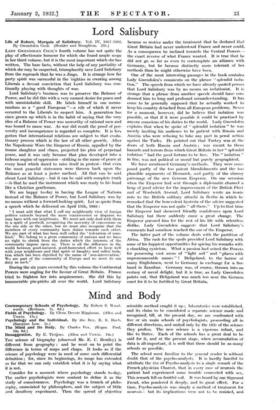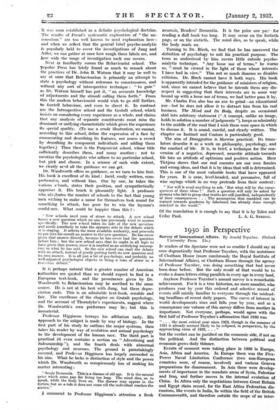Mind an
d Body Contemporary Schools of Psychology. By Robert S. Wood. worth. (Methuen. 7s. 6d.) Psychology and the Individual.. By the Rev. R. S. Birch. (Sampson Low. be.) _ The Mind and Its Body. 13y Charles Fox. (Kogan Paul. 108.6d.) Desuggestion. By E. Tietjens. (Allen and Unwin. 185.) THE science of biography (observed Mr. E. C. Bentley) is different from geography : and he went on to point the difference in terms of maps and chaps. It looks as if the science of psychology were in need of some such differential definition ; for, since its beginnings, its range has extended. .so far that we can only establish what it is by saying what
it is not.
Consider for a moment where psychology stands to-day. The earlier. psychologists were content to define it as the study of consciousness. Psychology was a branch of philo- sophy, enunciated by philoSophers, and the subject of little and desultory experiment. Then the spread of objective
scientific method caught it up ; laboratories were established and its claim to be considered a separate science made and recognized, till, at the present day, we are confronted with five or six main schools of psychologists, proceeding all in different directions, and united only by the title of the science they profess. The new science is a vigorous infant, and like to thrive. Each of the schools has a great deal to be said for it, and at the present stage, when accumulation of data is all-important, it is well that there should be as many schools as possible.
The school most familiar to the general reader is without doubt that of the psycho-analysts. It is hardly fanciful to attribute the rise of Psycho-analysis to a single remark of the French physician Charcot, that in every case of neurosis the patient had experienced some trouble connected with sex. This remark fell on fruitful soil. It was heard by one Siginund Freud, who pondered it deeply, and to great effect. For a time, Psycho-analysis was simply a method of treatment for neurosis : but its implications were not to. be resisted, and
it was soon established ns a definite psychological doctrine. The results of Freud's systematic exploration of " the un- conscious " are too well known to need explanation here : and when we reflect that the general label psycho-analytic is popularly held to cover the investigations of Jung and Adler, we can gather at once how rough these labels are, and how wide the range of investigation each one covers.
Next in familiarity comes the Behaviourist school. The popular Press has lately found so much to remark about the practices of Dr. John B. Watson that it may be well to say at once that Behaviourism is primarily an attempt to state a psychology without reference to consciousness, and without any sort of introspective technique : " to gain" as Dr. Watson himself has put it, " an accurate knowledge of adjustments and the stimuli calling them forth." From this the modern behaviourist would wish to go still further, to foretell behaviour, and even to direct it. In contrast are the Introspective school and the Gestalt school, which insists on considering every experience as a whole, and claims that any analysis of separate constituents must miss the dominant or unifying characteristic which gives the experience its special quality. (To use a crude illustration, we cannot, according to this school, define the expression of a face by enumerating and describing its features, nor assess a crowd by describing its component individuals and adding them together.) Then there is the Purposivist school, whose title sufficiently describes them, and many another ; not to mention the psychologists who adhere to no particular school, but pick and choose. In a science of such wide extent, we clearly need all the guidance we can get.
Dr. Woodworth offers us guidance, so we turn to him first. His book is excellent of its kind : lucid, easily written, com- prehensive, and without bias. One by one, he takes the various schools, states their position, and sympathetically appraiser it. His touch is pleasantly light. A professor who attributes the number of schools to the fact that young men wishing to make a name for themselves look round for something to attack, has gone far to win the layman's confidence. What could be happier than this ? :
New schools need mon of straw to attack. A new school raises a new question which no one has previously tried to answer spe,ifically. The new school takes its side of the now question and needs somebody to take the opposite side in the debate which it is staging. It selects the most available authority, and proceeds to put into his mouth an answer to the new question. He has never given that answer directly, because he has never had the question before him ; but the new school says that he ought in all logic to have given that answer, since it is implied as an underlying assump- tion in what he has said. So the new school can start the debate with an attack, instead of gently putting forth its now question and its own answer. It is all just a bit of psychology, and probably no well-adjusted psychologist objects to being a man of straw in a first-class debate."
It is perhaps natural that n greater number of American authorities are quoted than we should expect to find in a European text-book, and the prominence given by Dr. Woodworth to Behaviourism may be ascribed to the same source. He is not at his best with Jung, but there depre- ciation ends. This is an admirable text-book, sensible and fair. The excellence of the chapter on Gestalt psychology, and the account of Thorndyke's experiments, suggest where Dr. Woodworth's own preference may lie; but this is immaterial.
Professor Higginson betrays his affiliation early. His approach to the subject is made by way of biology. In the first part of his study he outlines the major systems, then takes his reader by way of evolution and animal psychology to the development of the human race. The third part is practical (it even contains a section on " Advertising and Salesmanship "), and the fourth deals with abnormal psychology and neuroses. The ground is painstakingly covered, and Profeo-,tor Higginson has largely succeeded in his aim. What he lacks is distinction of style and the power which Dr. Woodworth so conspicuously has of making his matter interesting " Senile Dementia. This is a disease of old age. It is the mental price which some pay for living too long. The mind dies, so to speak, while the body lives on. The disease may appear in the forties, but as a rule it does not come till the individual reaches the sixties."
I commend to Professor Higginson's attention a fresh neurosis, Readers' Dementia. It is the price one pay- for reading a dull book too long. It may occur on the fortieth page, or on the sixtieth. The mind dies, so to speak, while the body reads on.
Turning to Dr. Birch, we find that he has narrowed the definition of psychology to suit his practical purpose. The term as understood by him covers little outside psycho- analytic technique. " Any loose use of terms," he warns us, " must be viewed in the light of those whose interests I have had in view." This not so much disarms as disables criticism. Dr. Birch cannot have it both ways. His book is apparently intended for the guidance of ministers of religion, and, since we cannot believe that he intends them any dis- respect in suggesting that their interests are in some way bound up with a loose use of terms, we had better pass it by Mr. Charles Fox also has an axe to grind—an educational axe—but he does not allow it to distract him from his real business. The Mind and Its Body, despite an occasional skid into arbitrary statement (" A concept, unlike an image, holds in solution a number of judgments "), keeps so admirably to the middle of the road that I wish there were space in which to discuss it. It is sound, careful, and clearly written. The chapter on Instinct and Custom is particularly good.
The aim of Desuggestion is likewise practical. Its trans- lators describe it as a work on philosophy, psychology, and the conduct of life. It is, in brief, a technique for the con- version of a negative, depressed, neurotic attitude towards life into an attitude of optimism and positive action. Herr Tietjens shows that our real enemies are our own fancies and wrong ideas, and that it is by ideas that will is determined. This is one of the most valuable books that have appeared for years. It is sane, level-headed, and persuasive, full of wise sayings which in no way protrude from their context :
" Nor will it avail anything to ask, But what will bo the conse- quences of these ideas ? ' Such a question will only be asked by persons who fail to grasp that truths are self-justified, independently of their consequences . . . The assumption that mankind can be trained towards goodness by falsehood has already done enough mischief in the world."
Of the translation it is enough to say that it is by Eden and







































 Previous page
Previous page